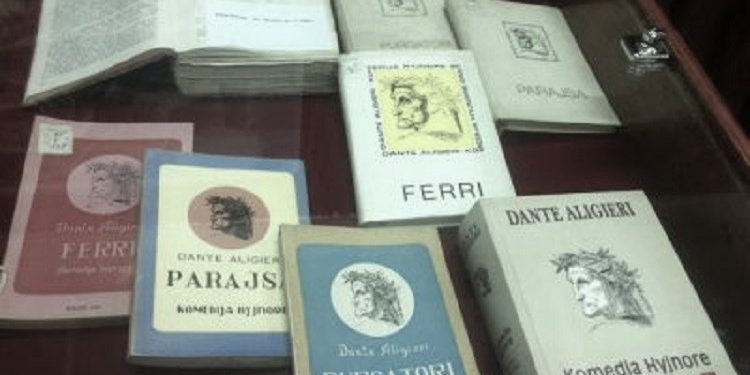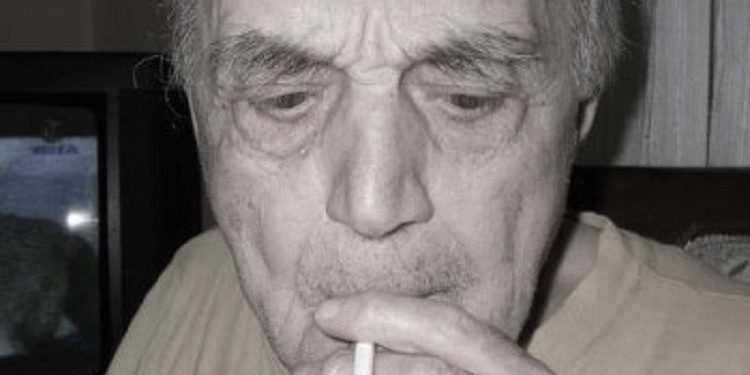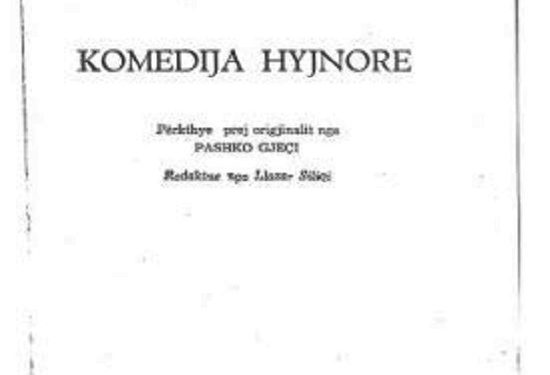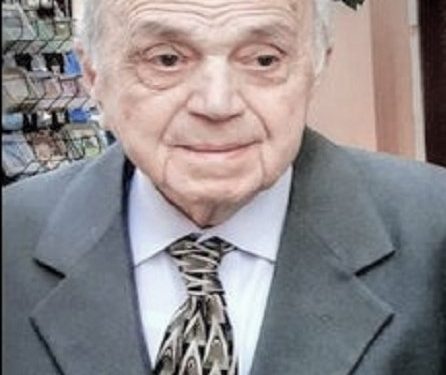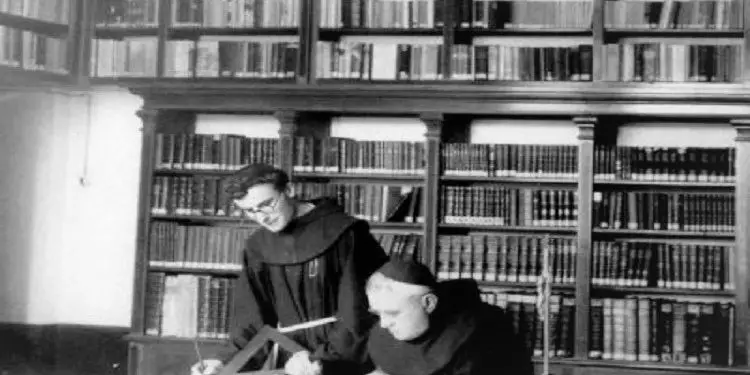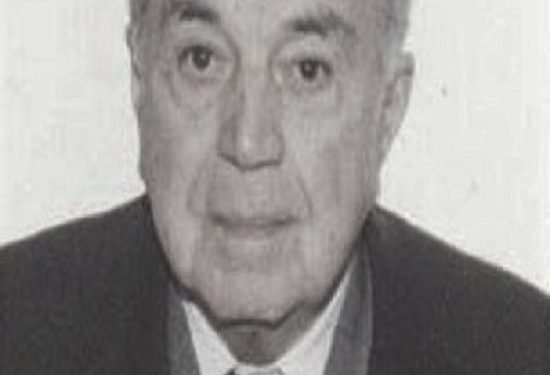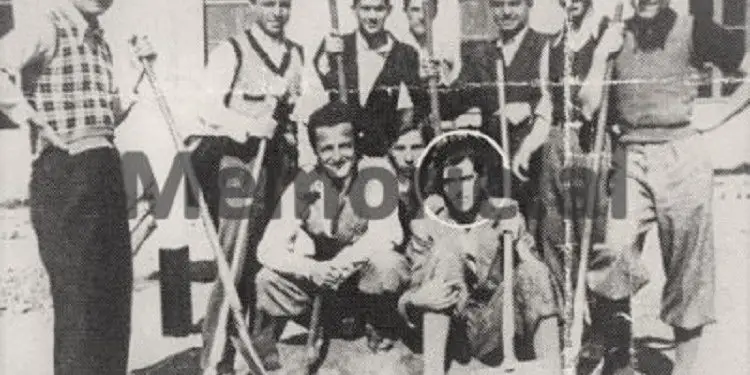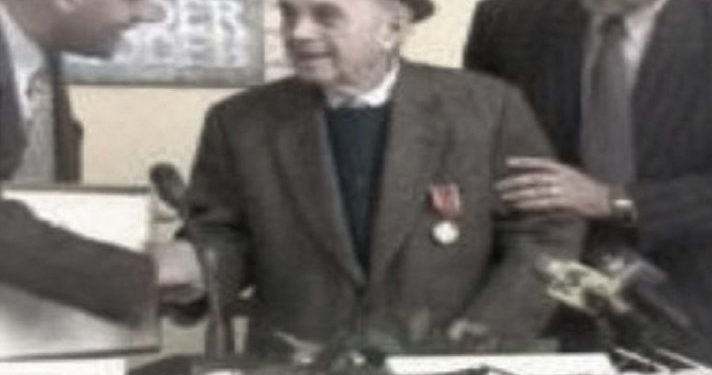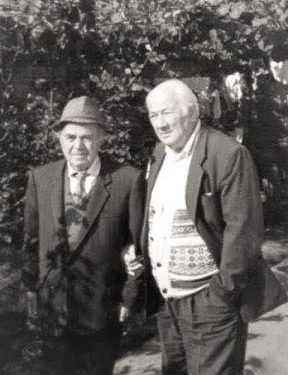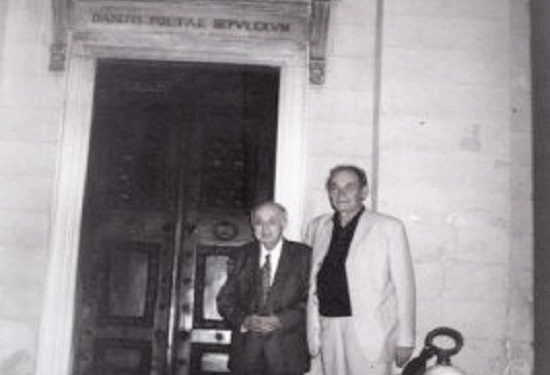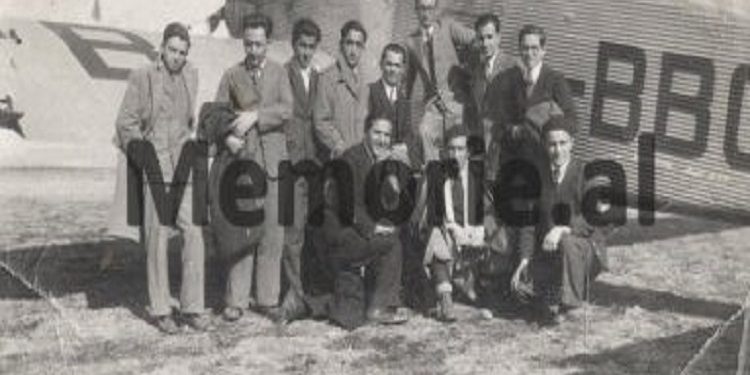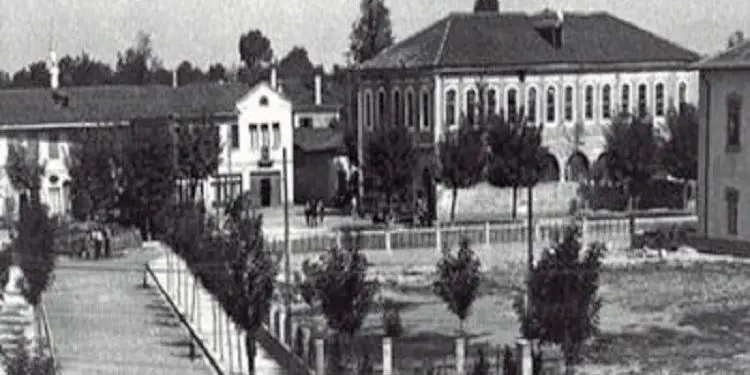Dashnor Kaloçi
Memorie.al publishes the unknown story of Pashko Gjeçi, the famous translator of some of the masterpieces of world literature, such as Dante Alighieri’s ‘Divine Comedy’, Homer’s ‘Odyssey’, Goethe’s ‘Faust’, Shakespeare’s ‘Hamlet’, ‘Andromaka’ and ‘Atalia’ of Rasin, etc., who after studying at the Jesuit College in the city of Shkodra, had completed the ‘Classical Gymnasium’ in a class with Arshi Pipë, Lazër Radin, Xheml Broja, Nikola Shurbani, Kol Ashtën, etc., where Qemal Stafa had a bank friend. The passion for poetry and literature in the school benches in the city of Shkodra, which he continued even after graduating from the Faculty of Philosophy and Literature in Rome, where he was sought as a lecturer, but the Minister of Education, Ernest Koliqi, who had gone there for assisted in awarding diplomas, told him to return home and make his contribution. Publication of the first poems and writings in the newspapers ‘Cirka’, ‘Shkëndia’ and ‘Hylli i Dritës’, where he also wrote an article about Padër Gjergj Fishta, who praised him in front of his friends, when they took the newspaper to his studio. The appointment of Pashko as a teacher in the city of Durrës where he was friends with the family of Jusuf Vrioni and his arrest, accused of being part of a “hostile organization” and sentenced to five years in political prison, which he suffered in Durrës and in Maliqi Swamp. Release from prison and appointment as a teacher in the town of Fushë-Krujë where he translated some of the masterpieces of world literature and then transferred to Tirana, after the letter he wrote to Enver Hoxha…!
This article about the well-known translator, Prof. Dr. Pashko Gjeçi, who made Shakespeare, Dante Alighieri, Homer, etc., ‘speak Albanian’, the colossus of world literature, was published in 2003 and Memorie.al republishes it in memory and homage on the occasion of the 11th anniversary of the separation of from life, on January 20, 2010.
We would not be wrong to say that there are few Albanian intellectuals or well-known people of Albanian literature, who know that the famous translator of the “Divine Comedy”, which is one of the masterpieces of world literature, or more precisely the man who made Dante Alighieri and Homer “speak Albanian” is called Pashko Gjeçi! Also, we would not exaggerate at all if we add again, that there are few Albanians (including the author of these lines) who know that man is still alive, how old he is and where he lives!
Even to put an end to these speculations and to stick to what we said above, this fact speaks for itself: The famous laureate Professor of Philosophy and Literature at the University of Rome, Qemal Stafa’s former bank friend, the student of Padër Gjergj Fishta, the colleague and close friend of famous professors, such as: Eqerem Çabej, Henerik Lacaj, Mark Dema and Fejzi Dika, did not even know the inhabitants of his degree, although for more than 20 years he has been living together with his mistress in that very small apartment, on the first floor at “Shallvaret”.
Amazed by the portrait and physique that appeared to us in the appearance of the man who welcomed us, I had never even thought that the one I was interested in meeting and that my friend, Rikard Ljarja, had talked to me so much, making I had the strangest ideas, it was Pashko Gjeçi himself, who was meeting with us! After the presentation made by Ricardi as soon as we entered, showing the purpose of our visit, Pashko Gjeçi answered us not without humor: “Be sure, I will show you, what I remember…”!
Although already at the age of 85 and very tired from the vicissitudes and stresses of a life full of waves and storms, the colossus of Albanian letters with a short stature and a portrait of a nobleman, named Pashko Gjeçi, sometimes surprised us with his memory brilliant and exquisite humor of Shkodra very intellect, who among other things, in his youth was educated and at the College of Jesuits in his hometown.
Classmate and on the bench with Qemal Stafa
Pashko Gjeçi was born in 1918 in the city of Shkodra and his family at that time lived in “Arra e Madhe”. Pashko’s father was called Gaspër, and at that time he had opened a small shop right next to his house, with which he made a living. After the death of his father and a younger sister named Nikolina, Pashko was left alone with his mother and other sister, Margarita. After finishing primary school with very good results, he enrolled in the Jesuit College, which he failed to finish, as religious schools were closed at that time. Regarding this, Pashko Gjeçi told us: “After the closure of the Jesuit College, we all continued our studies in the ‘Classical Gymnasium ’of the state, also in our city of Shkodra. At that time, I had a close friend Qemal Stafa with whom we were staying at a bank. In addition to Qemali, in our class we also had Nikola Shurbani, Xhemal Broja, Kol Ashta, Arshi Pipa and Lazër Radin, with whom I also had a great friendship. Qemal Stafa and Arshi Pipa were different from all of us classmates for ingenuity and intelligence, and Qemali has been the best student I have ever known. While I excelled mainly in the subject of literature, since I was little I was obsessed with it, I was very weak in drawing, which others did to me, and I handed them over as my own. At that time, the teacher that Qemali and I had the most affection for was Pashko Geci, who taught us ‘Ancient Greek’ and ‘Latin’. At first, he only had me under his patronage to teach me ancient Greek, but with me as a close friend, volunteers came out and Qemali and Nikola Shurbani, and the three of us managed to learn that language. Professor Pashko Geci used to buy my books and in order not to offend me because I had no money to pay him, he sent them to the bank. Shortly before finishing high school, Qemali left our class, because his family moved to Tirana “, recalled Pashko Gjeçi the years of the classical gymnasium of Shkodra, where he taught together with Qemal Stafa and both were the favorite students of Professor, Pashko Gecit.
Student of Philosophy in Rome
After graduating from the ‘Classical Gymnasium’ of Shkodra with very good results, in 1938, Pashko Gjeçi gained the right to study to pursue higher studies in Italy. In this regard, he recalled: “The right to study in Italy was given to me only thanks to the results I had achieved in the state gymnasium and the Ministry of Education granted me only a very small scholarship that I could hardly afford. meet the needs of living. But I had no other choice and was quite pleased to go to study at the Faculty of Philosophy of the University of Rome. This pleasure was added to me by the fact that Kol Ashta, Lazër Radi and Luigj Ljarja were with me. During the time I was studying in Rome, I started translating from Latin again or writing some small poems. I had a passion for poetry and translations since the banks of the Lyceum of Shkodra and what I wrote, I published in the magazine “Cirka” or “Shkëndia”. I remember that at that time I had written an article about Padre Gjergj Fishta, related to “Lahuta e Malsisë”, which was published in “Hylli i Dritës”. After the magazine came out, I and some other friends went and took Padre Gjergji to his studio. After seeing the article, Father Gjergji asked: ‘Who is the one who once wrote about me’?! As I stood speechless and shy at the end of the room, and my friends told him it was me, he said: ‘That particle there, having written this whole article’?! Thus, my desire and passion for poetry and translations did not fade even in Italy, and what I was writing I started to publish in Albania. I graduated from the Faculty of Philosophy and Literature in 1943 with high results and received the degree of Doctor of Science. Based on those results, I was offered to stay as an assistant professor at that Faculty, but I refused and returned to Albania. The desire to return to Albania was stimulated even more by the former Minister of Education, Ernest Koliqi, who at that time had come to Italy to participate in the ceremony of handing over our diplomas. Koliqi told me: “Return to Albania to give your contribution”, recalls Pashko Gjeçi, regarding his graduation at the Faculty of Philosophy and Literature in Rome, where he was offered to stay as an assistant professor.
Return to Albania and imprisoned
After graduating in Italy, in 1943, Pashko Gjeçi returned to Albania and the Ministry of Education of that time, appointed him as a professor of Literature and Latin, in the gymnasium of Shkodra, where he had been a student a few years ago. Even during this period until the end of the war, in addition to teaching in that gymnasium, Pashko again started translating, which he brought and published in Tirana in the magazine “Shkëndia”. After the communists came to power, Pashko continued to teach at that gymnasium, until the middle of 1945 and then he was transferred to the city of Durrës, where the ordeal of his suffering would begin. Regarding this, Pashko Gjeçi told us: “During the time I was working as a Literature teacher in the city of Durrës, I had close friendships only with the family of Jusuf Vrioni, who, like many other families from Tirana, had been interned there. At that time, in addition to teaching, I was elected and performed the function of President of the League of Writers and Artists for the Durrës branch. I do not know how it happened, but I remember that I was arrested there, ostensibly as implicated in an organization, which aimed to violently overthrow the communist government in Albania. This thing was all fabricated by the State Security, as well as that organization I was accused of belonging to, as I had never been involved in politics. At that time, Arshi Pipë was arrested in front of me, on the same charge as I had been arrested. The court sentenced me to five years in prison, which I did mainly in Durrës and in the Maliq swamp, where we were sent during the summer months. The work there was very hard and exhausting, but I could afford it and the whole prison, since I was young “, testified Pashko Gjeçi, regarding his arrest and the sentence of five years in prison, an accusation which, according to him, was completely fabricated by State Security.
Translator of Dante Alighieri and Homer
After his release from prison, Pashko Gjeçi returned to his hometown of Shkodra, where his mother and sister were waiting for him. Regarding this period, he testified: “As a former political prisoner, it was impossible for me to start working as a teacher and at that time I could hardly adjust to a manual job. After two or three years in that job, they allowed me to leave my hometown and brought me to the small town of Fushë-Krujë, where I was appointed as a teacher in a seven-year school. In that school where I taught for three years in a row, there were a total of four teachers and there I decided to translate the famous Italian poet Dante Alighieri, whose poems I had started translating since I was 17 in Shkodra High School banks. From that time on, in addition to Dante, I also had weaknesses for Giacomo Leopardi and Sappho, whose poems I always kept with me. I undertook the translation of Dante’s “Divine Comedy” because it was also translated in the Soviet Union, and its translator was awarded the “Stalin” prize. For its translation, I used the first hours of the morning before the lesson started and every day I wrote down four verses in Albanian. Some of these verses, if I am not mistaken, those of “Hell”, I told my close friend Lazar Silic, who immediately published them in the magazine “November”. Although they were well-liked and appreciated by many well-meaning people, the critics of the time were silent because he could not write about a former political prisoner. Since I had set myself the task of translating Dante at all costs, I continued to work every day, and there were times when for a verse, I needed three or four days of work. After translating thousands of verses in those three years, I translated the last four verses one Saturday, when my three colleagues had gone to Tirana. I finished them there around four o’clock in the morning and when I finished them, it seemed to me that the door opened and from there Dantja came out and left me alone “, Pashko Gjeçi recalled the moment when he finished writing in Albanian one of the masterpieces of world literature, Dante Alighieri’s “Divine Comedy”.
Evaluation by Enver Hoxha
After translating the famous Italian poet, Pashko Gjeçi consulted with his close friend Llazar Siliqi, who suggested that he write a letter to Enver Hoxha, outlining all the problems he had. About this, Pashko Gjeçi recalled: “At that time I wrote a letter to Enver Hoxha, where I informed him that I had in hand the translation of Dante Alighieri’s” Divine Comedy “and that for its completion, I needed to study in the Library National in Tirana and to consult with colleagues and researchers, to get opinions. After that letter, Enver Hoxha ordered that I be transferred to Tirana, where I would be deported. When I came to Tirana, I first stayed with the family of my uncle’s son, Ernest Gjeçi, and then I rented a small shop behind the Writers’ League, which I adapted as an apartment. At that time, with the help of Lazar Silic, the Publishing House “Naim Frashëri” published my complete translation “Divine Comedy”. After that I had many congratulations from friends and comrades, such as my professor Pashko Geci, Mark Dema, Henerik Lacaj and especially from professor Eqerem Çabej, who often came to my house “, recalled Pashko Gjeçi, regarding the vicissitudes he went through published Dante’s translation, which became possible only thanks to the intervention of Enver Hoxha. After “Divine Comedy” saw the light of publication in the Albanian language, Pashko was appointed as a professor at the University of Tirana, where he taught Latin, until it was removed from the curriculum in the early ’70s. At that time, Pashko was sent as an editor to the School Book Publishing House, where he retired in 1977. From that time, he respectfully remembers the friendship with his colleague Llazar Siliqi, but also with his student Pëllumb Xhufi, for which he states: “They have one of the best and kindest students I have ever had.”
How did he leave the house to his professor, Pashko Geci?!
For the contribution that Pashko Gjeçi had given in the translation into Albanian of two of the masterpieces of world literature, in 1979, he ordered me “from above” and the Executive Committee of Tirana was ordered to give him a residential apartment. But by mistake, the house authorization was sent to Pashko Geci, who entered the new house. When they went to apologize to Pashko for the mistake he made, he told them: “Let Pashko Geci enjoy that house and do not take it from him, because he has my best professor”. Since that time, when Pashko Gjeçi refused to take the house, which was mistakenly given to his former professor, he lives there in that small apartment (basement type) at “Shallvaret” and does not even expect to give it home! The only thing he expects and hopes for is to see the light of publication of some of his translations, such as Goethe’s “Faust”, Shakespeare’s “Hamlet”, Racine’s “Andromache” and “Atalia”, which he does not do you remember who gave it to you for publication…?! Memorie.al





